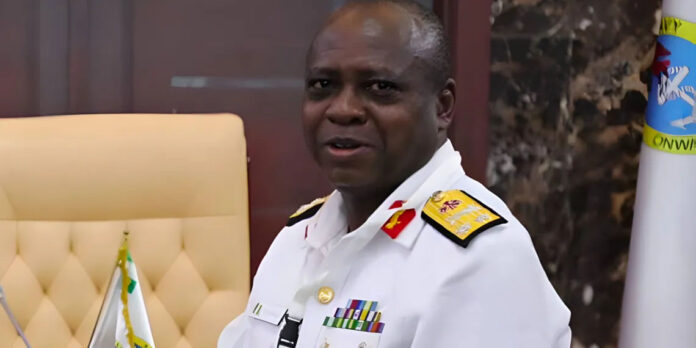The Chief of Naval Staff, Vice Admiral Emmanuel Ogalla, has proposed a comprehensive strategy that includes the designation of special courts for maritime crimes, advocacy campaigns to enlist community support, and socioeconomic crime prevention strategies, in an effort to combat maritime crimes and foster the growth of Nigeria’s Blue Economy.
Speaking Friday at the Institute for Peace and Strategic Studies’ 3rd Distinguished Personality Lecture, held at the Abiola Ajimobi Resource Centre, University of Ibadan, Ogalla highlighted the need for more effective and efficient justice delivery, as well as the importance of fostering trust and understanding between the Nigerian Navy and local communities.
The designation of special courts for maritime crimes, according to him, will ensure a dedicated and knowledgeable judicial process for handling these cases, which be said, will lead to more consistent application of laws and sentencing, reducing disparities and promoting fairness in judicial processes.
The Vice Admiral further advocated an advocacy campaign that utilises federal, state and local mass communication platforms to build public awareness and support for the Nigerian Navy’s efforts to combat maritime crimes and promote the Blue Economy.
Ogalla highlighted the significance of addressing socio-economic factors that contribute to maritime crimes, emphasising the importance of community engagement and outreach programmes, educational initiatives, and partnerships with key stakeholders.
He acknowledged that garnering public support is crucial in combating maritime crimes and fostering the Blue Economy, and that through effective communication and partnership, the Nigerian Navy can successfully enlist the cooperation of communities in their efforts.
Ogalla said: “The proposed way forward includes designation of special courts for maritime crimes, advocacy campaign for community support and socioeconomic crime prevention strategies.”
“Designation of Special Courts for Maritime Crimes
Establishing special courts dedicated to maritime crimes, would lead to more effective and efficient justice delivery, ultimately resulting in better outcomes for law enforcement.”
“Judges and court staff assigned to these special courts would develop knowledge and expertise in handling maritime crime cases, which would enhance quality of judicial decisions.”
“This would streamline legal procedures, reduce delays and ensure that cases are processed more efficiently. Moreover, special courts would ensure consistent application of laws and sentencing, thereby reducing disparities and promoting fairness in the judicial processes.”
“They would also alleviate the caseloads of general courts and reduce congestion and backlog, contributing to a more responsive and timely justice system. It would also increase public trust by demonstrating clear commitments to addressing maritime crimes, thereby emplacing confidence in the justice system.”
“The speedy prosecution of maritime crimes will also improve data collection and analysis, which are crucial for policy and legislative formulation in combating maritime crimes, for the development of the Blue Economy.”
“Advocacy Campaign for Community Support
The perceived lack of enthusiasm among communities in supporting efforts to combat maritime crimes and promote the Blue Economy is concerning and requires urgent improvement.”
“A strategic advocacy carnpaign, utilizing federal, state and local mass communication platforms, could be instrumental in building public awareness, establish trust and understanding as well as support for the Nigerian Navy and other security agencies.”
“Achieving this could involve community engagement and outreach programmes, educational initiatives, workshops and partnerships with stakeholders. Messages that emphasize importance of security agencies in maintaining public safety and national security, as well as the critical roles of public support could be delivered throúgh this medium.”
“The campaign will signifhcantly enhance community support for the Nigerian Navy with a positive impact to combat maritime crimes and contribute to development of the Blue Economy,” he emphasised.
Vice Admiral Ogalla concluded his lecture by urging a holistic approach to tackling maritime crimes, emphasizing that only by addressing the root causes of these crimes and enlisting the support of local communities can lasting solutions be achieved.
He reiterated the Nigerian Navy’s commitment to working towards a safer and more prosperous Blue Economy, and called for support and cooperation from all stakeholders to realise this goal.

